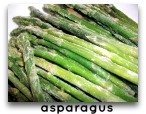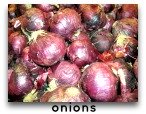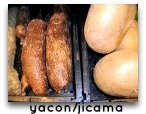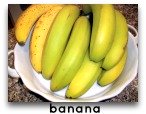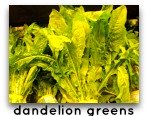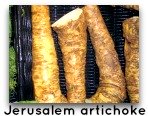- Home
- Prebiotics
Prebiotics
There hasn't been as much scientific study on prebiotics compared to other nutritional research. In fact, this may be your first time reading the word. Through clinical trials that have been done, medical professionals believe they are very important to our health.
Prebiotics Food List
Although it wouldn't be correct to call prebiotics 'food', they are found in food sources. Inulin, is the prebiotic found in large portions in Jerusalem artichoke and chicory root. They are even added to some foods such as yogurts, cereals, and ice creams. See the food list shown here for more food sources.
|
|
|
|
Jerusalem artichoke: They are actually not an artichoke. Good source of Iron and Potassium.
Chicory root: Good source of Vitamin B6, Vitamin C, Potassium, and Manganese.
Jicama: Good source of potassium, Vitamin C, and Dietary Fiber.
Banana: Contains a small amount of prebiotic fiber. Good source of Potassium, Dietary Fiber, Manganese, and Vitamin C.
Leeks: Good source of Magnesium, Folate, Vitamin K, Vitamin A, Vitamin C, Vitamin B6, and Manganese.
Asparagus: Good source of Iron, Zinc, Riboflavin, Vitamin A, Vitamin C, Vitamin E, Vitamin K, Magnesium, Selenium, and Copper.
Dandelion greens: Good source of Vitamin A, Vitamin C, Vitamin E, Dietary Fiber, Iron, and Calcium.
Breast milk: Beneficial for growing babies by protecting immune system.
Garlic: Good source of Vitamin C, Calcium, Selenium and Iron.
Onions: Good Source of Vitamin B6, Vitamin C, Folate, Manganese, and Dietary Fiber.
Prebiotics Definition
They can not be digested by humans in the upper gastrointestinal tract. Instead, they are food ingredients that when inside our body pass through the small intestines and go straight to the colon where certain microflora can ferment them. This process works similar to dietary fiber which changes our intestinal functions and influences the 'good' bacteria in our intestines to grow and increase in numbers. The end result is a healthier body with more healthy bacteria.
Prebiotics vs Probiotics
They work hand-in-hand by influencing and improving our microflora. Probiotics are actual living microorganisms that keep our gut flora in balance and are beneficial to health. Prebiotics feed and supports the growth of our friendly probiotic bacteria. Used together they just might provide an environment for faster healing and pain relief. It has been noted that too much consumption of prebiotics will cause gas and bloating. An alternative option would be to eat fermented foods such as sauerkraut instead.
Prebiotics Supplement
Supplements in the form of fructo-oligosaccharides (FOS) are popular along with inulin. Some controversy arises pertaining to FOS. Some people believe commercial FOS causes more intestinal upset. Where as a reliable source of inulin is thought to improve digestive health.
Prebiotics Benefits
The most important are inulin and oligofructose. Both can be found in food and plant sources and they nourish the bacteria in either the left or right side of our colon. Bifidobacteria and lactobacilli are the good bacteria found in our intestines that sometimes become overpowered by harmful bacteria. As the amount decreases due to illness, antibiotic use or other reasons, our immune system becomes compromised and we start to feel painful or irritating symptoms.
So, we need prebiotics to grow the good bacteria called probiotics. Once this is accomplished we can achieve overall well-being. This bifidobacterial growth impacts several bodily functions and may help heal illnesses like chronic gut disorders, Crohn's disease, ulcerative colitis (UC), diabetes, colon cancer, improve blood pressure and nutrient absorption.

Popular Articles
